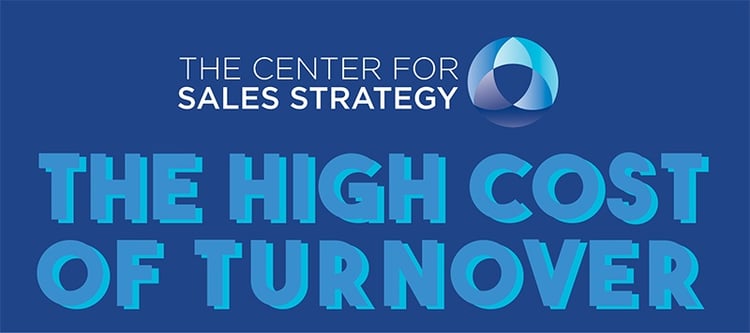
by Beth Sunshine, on February 12, 2018

by Beth Sunshine, on January 25, 2018

Here it is, the beginning of another new year and the perfect time to make sure you are setting yourself up for success in 2018. If you manage people, one of the best ways you can do this is to ensure that you have a strong talent bank — even if you do not plan on making a single hire.
A strong talent bank allows you to set the bar high for your team, hold people accountable to meeting expectations, and move forward without missing a beat if one of your people chooses to leave.
by Jim Hopes, on November 2, 2017

Just like “sales” and “marketing” are not the same, “recruitment” and “selection” are fundamentally different as well. But I often hear managers use them interchangeably—an indication of a fundamental and expensive flaw in their approach to maintaining a talented sales force.
by Trey Morris, on October 11, 2017

Turnover is a costly problem for sales organizations. On average, companies experience a 17.8% turnover each year, and the average cost to replace an employee is 1.5 - double the employee's annual salary. (And it's even higher for high-level employees like managers and those with specialized skills.)
Take a look at the high cost of turnover in the infographic below. What you find may surprise you!
by Trey Morris, on September 13, 2017

$112,500 is in flames every single time that you lose a salesperson and have to hire a new one!
Yes, over $112K!
How do you figure that dollar amount? Easy. The average cost of turnover for an employee is 1.5 times annual compensation. So, if your salesperson is earning $75,000 per year when they leave, it will cost your organization $112,500.
So, what if your top salesperson is making $150,000 per year? Then the cost of losing that sales rep and replacing them will cost your business $225,000! So, what is your turnover ratio? 10%, 25%, 50% per year? Then start adding up the cost of your turnover.
How does that affect your EBITA? Cash Flow? Net Profit?
A recent study from Bersin by Deloitte estimates the cost of turnover from 1.5 - 2.0 an employee's annual compensation. And a report from Maia Josebachvili, VP of People at Greenhouse, argued that retaining a salesperson for three years instead of two, along with better onboarding and management practices, yields a difference of $1.3 million in net value to the company over a three year period.
$1.3 Million?!?!
Yes, turnover is a big deal for your organization. A really big deal.
So, how do you "fix" turnover? Well, it's simple, but not easy. It's a process that can take months and in some cases even years to slow your rate of turnover in your sales organization, but here are 5 ways that you can reduce turnover:
by John Henley, on June 12, 2017

When you have openings on your staff, it's easy to get enamored with a candidate and jump to the finish line. That will always cost you in the long run. Every organization I know takes longer than they should to remove non-performing salespeople. It's just a fact. So you need to hire tough, so you can manage easy. If you hire easy, then you have to manage tough (threaten, push, and poke to get them to do what they should be doing).
by Tirzah Thornburg, on February 20, 2017

We have all been there. You walk into your new office. You’re excited, maybe a little nervous, but ready to take on this new challenge. And…no one is expecting you. The receptionist says, “Oh, was that today?? No one told me. I’m not sure where to have you start…” Bad first impression, sure, but what’s the big deal?
The big deal is that in today’s market, qualified job seekers have choices. Chances are that from the time you agree to hire them to the time they walk in your door, they have had multiple other requests for interviews and maybe job offers. You spent time finding and qualifying just the right person for this position. Do you want your new employee to walk away on that first day, thinking about finding a better job?
by Kurt Sima, on February 7, 2017

Many sales organizations miss revenue goals because they are understaffed and have open sales positions. This silent killer of productivity is a problem for many reasons:
by Beth Sunshine, on February 2, 2017

Sales staff turnover may be the most expensive and frustrating thing a sales manager has to deal with these days. You know the cost of making the wrong hire extends far beyond their salary and commissions, but did you know that their compensation probably only accounts for about 28% of your total loss? A recent study determined that managers waste about 150 hours of time on each wrong hire on top of the additional costs from soured client relationships, additional disruptions, and opportunity costs. Your mis-hire could cost you as much as 15 times their annual income!
by Guest Contributor, on November 23, 2016

Today we have a guest post from Danny Wong. Danny is a marketing consultant, sales strategist and writer. He does marketing at Tenfold, a seamless click-to-dial solution for high-performance sales teams. Connect with him on Twitter @dannywong1190.
Growth is good — it means that goals are being met and revenue is up. But hiring new team members brings challenges. The responsibilities of a sales manager change drastically as your sales team expands. Managing a modest team of five to 10 reps is easy when compared to overseeing a department with 30, 40, or 50 salespeople.
Here are three things you must keep in mind as a sales manager as your team begins to grow from small to large:
Improve your sales performance. Sales managers can gain unique perpsectives on hiring and developing more effective sales teams. Salespeople can improve their approach to getting more appointments with target prospects, uncovering desired business results, and engaging clients in a collaborative process that leads to the sale.
The Center for Sales Strategy
Contact Us
